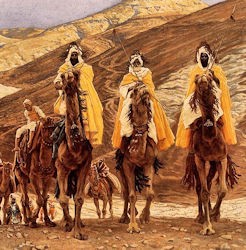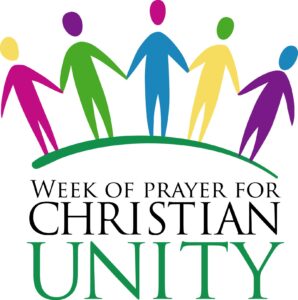January: Month of the Holy Name of Jesus

January is the Feast of the Holy Name of Jesus. Click here for a PowerPoint Presentation on the names for God and ideas on how we can show respect for God which was included in the Assoc. of Catholic Teachers January bulletin.
January 1st / Eanáir 1ú Solemnity of Mary, the Holy Mother of God / Sollúntacht Muire, Máthair Dé
On January 1st, the Church celebrates the Solemnity of Mary, the Holy Mother of God, our Lady’s greatest title. Pope Francis opened his first Angelus of the New Year by urging the faithful to join in “placing ourselves under the maternal and loving gaze of Mary Most Holy”. Pope Francis’ prayer is a lovely simple way of bringing our students in the presence of Our Lady as we begin a new year:
Holy Mother of God, to you we consecrate this New Year.
You, who know how to cherish things in your heart, care for us, bless our time, and teach us to find time for God and for others.
With joy and confidence, we acclaim you: Holy Mother of God! Holy Mother of God! Holy Mother of God…
“May Our Lady, who brought God into the world of time, help us to be generous with our time” Amen.
January 1st World Day of Peace / Lá Tiomnaithe do Shíocháin Domhanda
January 1st also marks World Day of Peace: the theme of this year’s Word Day of Peace is “The culture of care as a path to peace”. In marking this day, Pope Francis reminded us that: “Each one of us, the men and women of our time, is called to make peace a reality every day and in every area of life, extending a hand to a brother or sister in need of a word of comfort, a gesture of tenderness, a helping hand of solidarity”. https://www.vaticannews.va/en/pope/news/2021-01/pope-at-angelus-entrust-yourselves-to-mary-for-a-united-world.html
January 6th The Epiphany / An Eipeafáine
 Today the Church celebrates the Solemnity of the Epiphany. “The Lord and ruler is coming; kingship is his, and government and power.” With these words the Church proclaims that today’s feast brings to a perfect fulfilment all the purposes of Advent. Epiphany means manifestation. What the Church celebrates today is the manifestation of our Lord to the whole world; after being made known to the shepherds of Bethlehem He is revealed to the Magi who have come from the East to adore Him. Christian tradition has ever seen in the Magi the first fruits of the Gentiles; they lead in their wake all the peoples of the earth, and thus the Epiphany is an affirmation of universal salvation. https://www.catholicculture.org/culture/liturgicalyear/calendar/day.cfm?date=2021-01-03
Today the Church celebrates the Solemnity of the Epiphany. “The Lord and ruler is coming; kingship is his, and government and power.” With these words the Church proclaims that today’s feast brings to a perfect fulfilment all the purposes of Advent. Epiphany means manifestation. What the Church celebrates today is the manifestation of our Lord to the whole world; after being made known to the shepherds of Bethlehem He is revealed to the Magi who have come from the East to adore Him. Christian tradition has ever seen in the Magi the first fruits of the Gentiles; they lead in their wake all the peoples of the earth, and thus the Epiphany is an affirmation of universal salvation. https://www.catholicculture.org/culture/liturgicalyear/calendar/day.cfm?date=2021-01-03
January 10th Feast of the Baptism of our Lord / Féile Bhaisteadh an Tiarna
Today the Church celebrates the Feast of the Baptism of Our Lord. The Baptism of the Lord commemorates the Baptism of Jesus Christ by St. John the Baptist. This brings to an end the season of Christmas. The baptism of Jesus is reported in each of the three Synoptic Gospels—Matthew, Mark, and Luke. Clearly, Jesus’ baptism was an event of great significance for Jesus and for the early Christian community. Mark and Luke report the story from Jesus’ perspective; the voice from heaven is addressed to Jesus. In Matthew’s Gospel, the voice from heaven speaks to all who are present. The descent of the Holy Spirit on Jesus at his baptism shows that something new is beginning through the baptism and ministry of Jesus.
http://education.dublindiocese.ie/ppbaptismresources/
January 17th Celebrate World Religion Day / Ceiliúradh Domhanda ar Reiligiún
Our World has hundreds of nations with thousands of cultures that stretch back into pre-history, and throughout all that time we have had countless religions rise to prominence. Whether you are Hindu, Jewish, Catholic, Shinto, Buddhist, or one of a million other faiths, World Religion Day is your chance to share your culture with others and take an opportunity to learn from others about theirs. The aim of World Religion Day, held on the third Sunday in January every year, is to promote inter-faith understanding and harmony. Through a variety of events held around the globe, followers of every religion are encouraged to acknowledge the similarities that different faiths have.
January 18th-25th Christian Unity Week /Aontacht Chríosta
 The Week of Prayer for Christian Unity is traditionally observed from the 18th to the 25th January – the octave of St. Peter and St. Paul. The theme for 2021 is:
The Week of Prayer for Christian Unity is traditionally observed from the 18th to the 25th January – the octave of St. Peter and St. Paul. The theme for 2021 is:
“Abide in my love and you shall bear much fruit” John 15: 1-17
“An té a fhanann ionamsa, agus mise ann, tugann seiseann toradh mór uaidh.”
The Week of Prayer for Christian Unity in 2021 has been prepared by the Monastic Community of Grandchamp in Switzerland. The theme that was chosen, “Abide in my love and you shall bear much fruit”, is based on John 15:1-17 and expresses Grandchamp Community’s vocation to prayer, reconciliation and unity in the Church and the human family.
Today the community has fifty sisters, all women from different generations, Church traditions, countries, and continents. In their diversity the sisters are a living parable of communion. They remain faithful to a life of prayer, life in community and the welcoming of guests. The sisters share the grace of their monastic life with visitors and volunteers who go to Grandchamp for a time of retreat, silence, healing or in search of meaning. For 2021, the sisters are inviting churches across the world to enter into their tradition of prayer and silence that is rooted in the ancient traditions of the Catholic Church
Show your support for Christian Unity by posting unity messages and details of your events to our Week of Prayer for Christian Unity Twitter wall – simply add the #wpcuwall hashtag to your Twitter post (note there is a delay before they appear). You can also find updates about the Week of Prayer for Christian Unity on Twitter by following the #wpcu2021 hashtag and resources are available at: https://ctbi.org.uk/week-of-prayer-for-christian-unity-2021/
Click here for a PowerPoint presentation on the history of the Church and what Christian Unity week is all about which has been provided by Association of Catholic Teachers Ireland in their recent newsletter.
January 21st Martin Luther King Day / Lá in onóir Martin Luther King
“The Christian is called, with the grace of God invoked in prayer, to a sometimes-heroic commitment”.
– Veritatis Splendor (The Splendor of Truth)—Pope John Paul II, 1993
Martin Luther King Day is a federal holiday held on the third Monday of January. It celebrates the life and achievements of Martin Luther King Jr., an influential American civil rights leader. The 1968 assassination of civil rights icon Martin Luther King Jr. stunned the nation, but his work continues to inspire the pursuit of racial equality in America. On August 28, 1963, more than 250,000 people gathered on the National Mall in Washington, D.C., to hear what is now considered one of the most powerful speeches in history. A young Baptist
minister named Martin Luther King Jr. addressed the crowd, assembled that day for the March on Washington, a protest rally he helped organise.
“I have a dream, that one day this nation will rise up [and] live out the true meaning of its creed: We hold these
truths to be self-evident, that all men are created equal”.
Let us take this day with our students, to reflect on the life of Martin Luther King, Jr., a man whose commitment to ridding the world of social sin resulted in discrimination, defamation of character, and ultimately his death. Dr. King is one of the most influential men of our times. His life and ministry continue to remind our nation and the world that the acts of injustice we confront daily require the faith-filled and faith- guided engagement of our heads, hearts, and hands.
Let us pray:
As we venture forth to be women and men of service, Lord go before us as our Guide. Renew us with the spirit of service and sacrificial love exemplified in the life of Dr. King. May we be vessels of hope and justice in a world inundated with countless forms of violence and injustice. May we never stand on the side-lines as we witness injustice done upon our sisters and brothers but walk with eyes open to the needs of our communities, with ears open to the needs of our world, and with hands open in helpful service to our neighbours. Then we will not only be blessed but be a blessing to our world. We make this prayer through Christ Our Lord. Amen
https://junior.scholastic.com/pages/content-hubs/the-civil-rights-movement.html
http://education.dublindiocese.ie/ppmartinlutherkingresources/
24th–31st January Catholic Schools Week 2021 / Seachtain na Scoileanna Caitliceacha 2021
The overarching theme for CSW 2021 will be: Catholic Schools:Communities of Faith and Resilience. / Pobail Chreidimh agus Teacht Aniar
This particular theme will be especially relevant given the pandemic experience that is affecting the entire country. The following will be the daily themes for CSW 2021:
(1) Monday: Catholic Schools: Communities of Faith.
(2) Tuesday: Catholic Schools: Communities of Learning
(3) Wednesday: Catholic Schools: Communities of Love
(4) Thursday: Catholic Schools: Communities of Resilience
(5) Friday: Catholic Schools: Communities of Hope
Resources for Catholic Schools Week will be uploaded on www.catholicschools.ie and once upload I will forward them onto each school.
January 24th St. Francis de Sales / Naomh Proinsias de Sales
Francis was ordained and elected provost of the Diocese of Geneva, then a centre for the Calvinists. Francis set out to convert them, especially in the district of Chablais. By preaching and distributing the little pamphlets he wrote to explain true Catholic doctrine, he had remarkable success. At 35, he became bishop of Geneva. While administering his diocese he continued to preach, hear confessions, and catechize the children. His gentle character was a great asset in winning souls.
Besides his two well-known books, the Introduction to the Devout Life and A Treatise on the Love of God, he wrote many pamphlets and carried on a vast correspondence. For his writings, he has been named patron of the Catholic Press. His writings, filled with his characteristic gentle spirit, are addressed to lay people. He wants to make them understand that they too are called to be saints.
In spite of his busy and comparatively short life, he had time to collaborate with another saint, Jane Frances de Chantal, in the work of establishing the Sisters of the Visitation. These women were to practice the virtues exemplified in Mary’s visit to Elizabeth: humility, piety, and mutual charity. They at first engaged to a limited degree in works of mercy for the poor and the sick. Today, while some communities conduct schools, others live a strictly contemplative life.
https://www.franciscanmedia.org/saint-of-the-day/saint-francis-de-sales
January 25th The Conversion of St. Paul / Iompú Naomh Pól
Saint Paul is one of the most important and influential of all the saints. Many of his writings are contained in the Canon of the Bible and have influenced the growth and development of the Church since the first century. Saint Paul’s entire life can be explained in terms of one experience—his meeting with Jesus on the road to Damascus.
St. Paul was originally known as Saul, and he was a Roman citizen and a Pharisee. He even presided over the persecutions of the early Christians and was present at the martyrdom of St. Stephen. However, Saul experienced a powerful vision that caused him to convert to Christianity while on the road to Damascus. He was duly baptized and took the name Paul and began travelling and preaching the Faith. He was martyred as an Apostle in Rome around 65 AD.
https://www.catholic.org/search/?q=conversion+of+Paul
https://www.catholicculture.org/culture/liturgicalyear/calendar/day.cfm?date=2021-01-25
January 26th Saints Timothy and Titus / Naoimh Timóteas agus Titas
St. Timothy, born in Galatia in Asia Minor, was baptised, and later ordained to the priesthood by St. Paul. The young Galatian became Paul’s missionary companion and his most beloved spiritual son. St. Paul showed his trust in this disciple by consecrating him bishop of the great city of Ephesus. St. Timothy was stoned to death thirty years after St. Paul’s martyrdom for having denounced the worship of the goddess Diana.
St. Titus, a convert from paganism, was a fellow labourer of St. Paul on many apostolic missions. St. Paul later made him bishop of Crete, a difficult charge because of the character of the inhabitants and the spread of erroneous doctrines on that island. St. Paul’s writings tell us that St. Titus rejoiced to discover what was good in others and drew the hearts of men by his wide and affectionate sympathy.
https://www.catholicculture.org/culture/liturgicalyear/calendar/day.cfm?date=2021-01-26
January 27th Holocaust Memorial Day / Lá Cuimhneacháin ar an Il-loscadh
Be the light in the darkness
 The theme for Holocaust Memorial Day (HMD) 2021 is be the light in the darkness. It encourages everyone to reflect on the depths humanity can sink to, but also the ways individuals and communities resisted that darkness to ‘be the light’ before, during and after the genocide. This theme asks us to consider different kinds of ‘darkness’, for example, identity-based persecution, misinformation, denial of justice; and different ways of ‘being the light’, for example, resistance, acts of solidarity, rescue and illuminating mistruths.
The theme for Holocaust Memorial Day (HMD) 2021 is be the light in the darkness. It encourages everyone to reflect on the depths humanity can sink to, but also the ways individuals and communities resisted that darkness to ‘be the light’ before, during and after the genocide. This theme asks us to consider different kinds of ‘darkness’, for example, identity-based persecution, misinformation, denial of justice; and different ways of ‘being the light’, for example, resistance, acts of solidarity, rescue and illuminating mistruths.
Increasing levels of denial, division and misinformation in today’s world mean we must remain vigilant against hatred and identity-based hostility. Rapid technological developments, a turbulent political climate, and world events beyond our control can leave us feeling helpless and insignificant. The utterly unprecedented times through which we are living currently are showing the very best of which humanity is capable but also – in some of the abuse and conspiracy theories being spread on social media – the much darker side of our world as well.
We can all stand in solidarity. We can choose to be the light in the darkness in a variety of ways and places – at home, in public, and online.
https://www.hmd.org.uk/what-is-holocaust-memorial-day/this-years-theme/
Holocaust Education Trust Ireland
HETI aims to educate and inform people about the Holocaust. The National Holocaust Memorial Day commemoration takes place in Dublin every year on the Sunday nearest to the 27 of January, in the Mansion House. It is organised under the auspices of Holocaust Education Trust Ireland in association with The Department of Justice and Equality and Dublin City Council. This year the event will take place online on the 24th January 2021 at 6 pm.
The Holocaust Memorial Day commemoration cherishes the memory of all who perished in the Holocaust. It recalls six million Jewish men, women and children and millions of others who were persecuted and murdered by the Nazis because of their ethnicity, disability, sexual orientation, political affiliations, or their religious beliefs. The ceremony includes readings, survivors’ recollections, candle-lighting, and music. It is attended by people from all walks of life and is a moving and dignified event.
To attend: There is no charge for attending HMD. To register fill in your details on:
https://hetireland.org/programmes/holocaust-memorial-day-2021-commemoration/
January 28th Feast Day of St. Thomas Aquinas / Féile Naomh Tomás Acuin
Saint Thomas Aquinas, whose feast day is celebrated each year on the 28th of January was a Dominican, a member of the Order of Preachers.
Thomas was not afraid of new ideas, rather he engaged with them through study, listening, talking with others and by praying. Thomas was concerned with understanding how people would know what was right and what was wrong. While study was important to Thomas, praying was even more so. To sit and listen to God and to delight in God in our lives. He understood the need to look and listen paying attention to how God is a part of our lives. If we can do this perhaps, we can be joyful and compassionate as Thomas was and as he was remembered by those who lived with him. He had a strong desire to know God.
While Thomas is very much remembered for his brilliant mind, his written work, as being somewhat of a genius and highly regarded in the academic world his life in prayer and study of scripture were central to him. He was very much a man of prayer. One of his many quotes was ‘Humility is what makes a person capable of God’ and he openly declared that ‘prayer and the help of God had been of far greater service to him in the search for truth than his natural intelligence and habit of study’.
Thomas always attempted to look at everything from the inside and could be regarded in the most exact sense of the term, Humanist, because he insisted on the immense importance of the human being in the theological scheme of things…for in his very humanism he affirmed the doctrine of Incarnation, the divinity of Christ.
He died on March 7th, 1274. His pursuit of truth and desire to know God are what hold him in high regard. He was declared Patron of all Universities and Catholic Schools.
(A prayer of St Thomas Aquinas)
Grant me, O Lord my God,
a mind to know you,
a heart to seek you,
wisdom to find you,
conduct pleasing to you,
faithful perseverance in waiting for you,
and a hope of finally embracing you. Amen.
January 30th Feast Day of St. Aidan of Ferns / Naomh Maodhóg (Aodhán) Priomhéarlamh Deoise Fhearna
Aidan was born in Inis Breachmhaigh, now known as Port, Inch or Mogue’s Island, in Templeport Lake, near Bawnboy in County Cavan, around 550. Both his father Setna and his mother Eithne were of noble origin. There was no boat to take the infant to the mainland to be baptised, so he is said to have been miraculously floated across the lake on a slab of stone to where Saint Kilian was waiting to baptise him. The parish church of Templeport parish (St. Mogue’s Church in Bawnboy) in the diocese of Kilmore is called after him and the church’s holy water font is said to be made from part of that stone.
The written “vitae” of Saint Aidan are composed mostly of miracles attributed to him. He is attributed with astonishing feats of austerity, such as fasting on barley bread and water for seven years, as well as reciting 500 Psalms daily. This saint illustrates the close co-operation that existed between the Celtic churches in Ireland and Wales. He was the greatly loved disciple of Saint David for many years and during that time he was usually known by his baptismal name of Aedan but later in Ireland, where he founded the famous abbey at Ferns in County Wexford, he was given the prefix of endearment making his name Maedoc that was usually pronounced Mogue. He continued on with his missionaries and founded thirty churches and numerous monasteries. Many are still in use today. He died of natural causes on January 31 (his patronal feast day) c 632 and is buried under the cathedral in Ferns.
https://catholicsaintmedals.com/saints/st-aedan-of-ferns/
January 31st Feast Day of St. Don Bosco / Féile Naomh Eoin Bosco
Born in Castlenuovo d’Asti on August 16, 1815, John was educated in the faith and in living according to the Gospel message by his mother. He was just nine years old when he had a dream, which called him to dedicate himself to the education of young people. While still a boy, he began to entertain his peers with games alternated with work, prayer, and religious education.
On becoming a priest (1841), he chose as his life’s programme: “Da mihi animas cetera tolle” (“Give me souls, take all the rest” Gen. 14: 21). He began his apostolate among poor young people with the founding of the Oratory, which he placed under the patronage of St. Francis de Sales.
He led young people to meet Christ by means of his educational style and pastoral practice, based on reason, religion, and loving kindness (the Preventive System). He led young people to reflect, to meet Christ and their brothers and sisters, to the study of the faith and to apostolic, civil, and professional commitment. St. Dominic Savio stands out among the most outstanding fruits of his work.
The source of his indefatigable activity and of the effectiveness of his work was his “constant union with God” and his unlimited confidence in Mary Our Help who he considered to be the inspiration and support of his whole work. He left, as an inheritance for his Salesian sons and daughters, a form of religious life that was simple but founded on solid Christian virtue and on contemplation in action, which may be summed up in the words “work and temperance.”
https://salesianmissions.org/about-us/who-we-are/about-st-john-bosco/
Click here for a PowerPoint Presentation on the life of St. Don (John) Bosco kindly provided by the Association of Catholic Teachers in their January newsletter.

